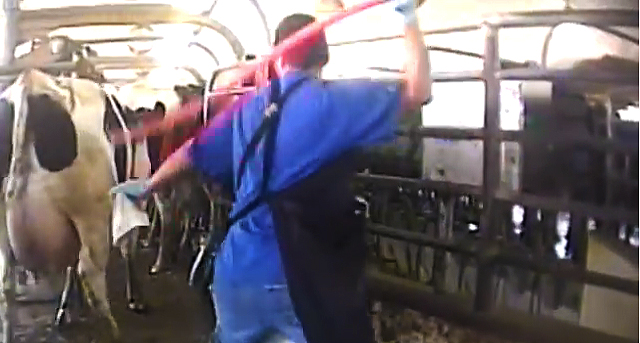
Worker beating a cow. Video Capture via Mercy for Animals
In 2012, workers from Bettencourt Dairies of Wendelll, Idaho were caught sexually molesting, beating, punching and kicking cows in an undercover video shot by Mercy for Animals of Los Angeles. The workers were convicted of animal cruelty and fired. The Idaho legislature moved swiftly in response. It introduced Senate Bill 1337 to outlaw the recording of such abuses. Governor C.L. “Butch” Otter signed the bill on February 28.
Welcome again to the convoluted, unconstitutional world of ag-gag law.
A national outcry and petition drive of more than 40,000 signatures failed to defeat the Idaho measure. In a blog for Huffington Post, Nathan Runkle, executive director of Mercy for Animals, wrote that S1337 makes it a crime punishable by imprisonment:
[T]o simply photograph or videotape abusive, unsanitary or otherwise unethical activity on a farm. Even employees and journalists who take photos or video to document misconduct on farms — whether it’s mistreatment of animals, food safety hazards, worker safety violations, sexual harassment, financial embezzlement, or environmental crimes — could face criminal prosecution

Hamdi Ulukaya, CEO of Chobani Yogurt, broke with the dairy industry when he announced his opposition to Idaho’s ag-gag law. Via Chobani
According to the American Civil Liberties Union, ag-gag laws:
. . .threaten to virtually eliminate undercover investigations into not just animal abuse, but labor practices, food safety, environmental pollution, and numerous other consumer and public welfare concerns. Worse, many ag-gag laws and bills are quite loose in their definition of agricultural operations, meaning they would cover not only factory farms and slaughterhouses, but even supermarkets and restaurants.
Aside from the public policy concerns, ag-gag laws raise major constitutional issues, some of which may not be immediately obvious.
Support for ag-gag laws comes from expected quarters, such as CAFO operators, farm bureaus, cattleman associations, and Monsanto. But unexpected supporters carry the ag-gag flag as well. Senator Diane Feinstein, D-CA, was a lead sponsor of the Animal Enterprise Terrorism Act (AETA), an egregiously unconstitutional statute that makes it a federal crime of terrorism to engage in activities that have a negative affect on the profits of any animal-related enterprise, even a puppy mill, and even if by organizing a boycott or demonstration. The first indictment under AETA occurred in Calfornia. A year later, the charges were thrown out by a federal judge. Senator Feinstein offered no comment. (See: EarthDesk, November 2, 2013 )
But opposition to ag-gag gained a new friend when Hamdi Ulukaya, Founder and Chief Executive Officer of Chobani Yogurt of South Edmeston, NY added his vocal opposition to the Idaho bill:
A bill is up for approval in Idaho that, if passed, would limit transparency and make some instances of exposing the mistreatment of animals in the state punishable by imprisonment. This could cause the general public concern and conflicts with our views and values.
As someone who grew up on a farm, I believe deeply that the humane treatment of animals is an ethical and moral imperative and, having spent a lot of time in upstate New York and Idaho, I know hundreds of farmers feel the same.
When I founded Chobani, it was based around these core values and principles. And we chose Idaho for Chobani’s second home because of its deep farming culture, sense of community and shared values.
So I am joining many folks across the country in asking Governor Otter to reconsider the bill before him.
Though Chobani operates a nearly one-million square foot facility in Twin Falls, Idaho, its opposition to the bill fell on deaf ears. In addition to Idaho, the states of Iowa, Utah, Missouri, North Dakota, Montana and Kansas have adopted ag-gag laws.
In an April 26, 2011 editorial, The New York Times wrote:
Exposing the workings of the livestock industry has been an undercover activity since Upton Sinclair’s day. Nearly every major improvement in the welfare of agricultural animals, as well as some notable improvements in food safety, has come about because someone exposed the conditions in which they live and die. Factory farming confines animals in highly crowded, unnatural and often unsanitary conditions. We need to know more about what goes on behind those closed doors, not less.
More EarthDesk posts related to ag-gag and CAFOs here.
View the Mercy for Animals undercover video. WARNING: Graphic imagery and language.










I heard negative comments with regards to Chobani and the milk that is used from control area feedlot operations that are located above the Snake River aquifer that flows into the Snake River. The concern is is that the feedlot operations in all the manure will eventually make it into the aquifer that flows under the volcanic rock and the disappearing river that comes out to the Snake River below Twin Falls. This has the potential of contaminating some long stretches of the Snake River and a lot of people do not know what the hydrology of the area.